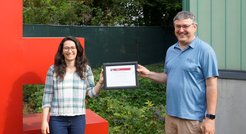More stable lasers for next-generation gravitational-wave detectors
AEI Hannover scientist receives international award for doctoral thesis
Dr. Marina Trad Nery, a post-doctoral researcher at the Albert Einstein Institute (AEI) in Hannover will be awarded the 2020 GWIC-Braccini Thesis Prize for her PhD thesis “Laser Power Stabilization via Radiation Pressure”. With the prize, the Gravitational Wave International Committee (GWIC) recognizes the importance of her work to the field of gravitational waves and gravitational-wave detection. The prize will be awarded at the online Amaldi 14 meeting on 22 July 2021, where Trad Nery will present her research.
Improving lasers at the heart of future detectors
Gravitational-wave detectors rely on high-power laser sources. Their light must be of as high and as constant quality as possible: in terms of its brightness and several other parameters.
In her doctoral studies, Trad Nery developed a novel scheme to sense, correct and stabilize miniscule fluctuations of the laser’s brightness (the laser power) at the heart of the detectors. The new method can be implemented in future generations of ground-based gravitational-wave detectors such as the Einstein Telescope or Cosmic Explorer.

“I am honoured and very happy to receive this prize,” says Marina Trad Nery, a postdoctoral researcher at AEI Hannover. “In my thesis I showed how the power fluctuations from lasers for gravitational-wave detectors can be sensed by the force their photons exert on a microscopic mechanical oscillator. The position of this mechanical device, which encodes the power fluctuations, can in turn be read out by an ancillary laser interferometer without affecting the laser to be stabilized.”
Trad Nery demonstrated the validity of her novel scheme in a proof-of-principle experiment at the AEI Hannover. The micro-oscillator for this experiment was provided by collaborators from Louisiana State University.
The awardee
Dr. Trad Nery is from Brazil and studied physics there at the University of Campinas. For her PhD studies, she came to the Max Planck Institute for Gravitational Physics and Leibniz Universität Hannover in early 2015 with a fellowship from the Marie Curie International Training Network “GraWiToN”. She was awarded the 2020 Prize of the Leibniz Universitätsgesellschaft e. V. for outstanding scientific achievements, social commitment, and university activities. She also spent several months at the Virgo gravitational-wave detector in Italy, working on improvements to the instrument between two observing runs. Since October 2020, she works as a researcher in the group “Advanced Light Sources” in the Cluster of Excellence “Quantum Frontiers”.
The GWIC Braccini Thesis Prize
The Gravitational Wave International Committee (GWIC) and the Friends of Stefano Braccini award an annual prize to outstanding PhD theses in the field of gravitational waves, the GWIC-Braccini Thesis Prize. Winning theses are chosen based on originality and creativity of the research, its importance to the field of gravitational waves and gravitational-wave detection, and the clarity of presentation. Each winner will receive a certificate of recognition and a prize of US$ 1,000. Trad Nery’s thesis was selected from 17 nominations for the prize.












